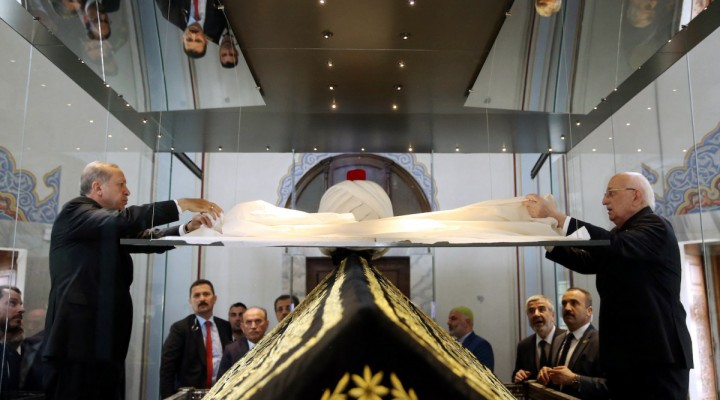So what if the Ottomans shaped the modern world?

Erdogan is mesmerized by Caliph Selim but, unlike Machiavelli, he doesn’t fear him; he wants to emulate him
Once upon a time in Anatolia, in the late 13th century a Turkic principality – one of many shaped in the wake of the Mongol invasion of the 1240s – consigned the Seljuk Turks to the past and emerged as the Ottoman emirate. It was named after its founder, Osman I.
By the middle of the 15th century, the time of the game-changing conquest of Constantinople by Sultan Mehmet II, the expanding Ottoman empire had absorbed virtually all its neighboring Turkic emirates.
And by the start of the 16th century, what sprang up was a multi-religious and multi-ethnic empire that – pragmatic and tolerant – ruled for four centuries over the Balkans, Anatolia and Southwest Asia.
Talk about a major historical riddle: How did a small principality in the western fringe of what used to be known as Asia Minor turn into what could arguably be defined as Islam’s most important empire? The key to unlocking the riddle may be offered by Sultan Selim I.
God’s Shadow, which in its original English edition (Faber & Faber) is subtitled The Ottoman Sultan Who Shaped the Modern World, may reveal that author Alan Mikhail, chair of the Department of History at Yale, is uniquely qualified to argue the case.
Mehmet II, who with his endless obsession and cunning extinguished the Byzantine empire on the fateful May 29, 1453, when he was only 21, was a larger-than-life figure for peoples of the Mediterranean, the Balkans and Asia Minor.
He bridged Europe and Asia. He refashioned Constantinople, renamed Istanbul, into the capital of the sprawling empire. He lorded over the silk roads from the Black Sea to the Mediterranean. The Fatih (“Conqueror”) assumed mythical proportions east and west – and even branded himself Caesar, heir to Byzantine emperors.

Mehmet II conquered the Balkans in the 1460s, finished off with Genoese trading colonies in Crimea and imposed vassalage over the Crimean Tatar Khanate in 1478. That meant, in practice, turning the Black Sea into a virtual Ottoman lake.
Author Mikhail stresses right at the start that the Ottoman Empire was the most powerful state on earth – more powerful than the Ming dynasty, not to mention the Safavids – for quite some time. It was the largest empire in the Mediterranean since ancient Rome and “the most enduring” in the history of Islam.
Then he sets the crux of the – explosive – thesis he will develop in detail: “It was the Ottoman monopoly of trade routes with the East, combined with their military prowess on land and on sea, that pushed Spain and Portugal out of the Mediterranean, forcing merchants and sailors from these 15th-century kingdoms to become global explorers as they risked treacherous voyages across oceans and around continents – all to avoid the Ottomans.”
This thesis will be extremely unpalatable to a hegemonic (at least for the past 150 years) West, now confronted with its turbulent decline. Mikhail does his best to show how, “from China to Mexico, the Ottoman empire shaped the known world at the turn of the 16th century.”
Obviously ideological, military and economic competition with the Spanish and Italian states – and then Russia, China and other Islamic states – was no holds barred. Still, Mikhail relishes showing how Columbus, Vasco da Gama, Montezuma, Luther, Tamerlan – one and all “calibrated their actions and defined their very existence in reaction to the reach and grasp of Ottoman power.”
Geoeconomic superpower
It takes a lot of balls for a historian employed by an elite American university to offer a self-described “revolutionary” narrative on the role of Islam and the Ottomans in shaping not only the Old World, but also the New World. Mikhail is fully aware of how this will come as “a bitter pill for many in the West.”
Exit Muslims as the “terrorist.” Exit “the rise of the West.” Enter the Ottomans as a civilizing power. Mikhail is adamant: The practice “since the Industrial Revolution and the so-called glories of the 19th century” of stretching European primacy back to Columbus “is a historical absurdity.” The Ottoman empire “struck fear into the world for centuries before it earned its derogatory 19th-century sobriquet, ‘the sick man of Europe.’”
The fact is that, for all its setbacks, the Ottoman Empire – in over 600 years of history – remained the hegemon in the Middle East and one of the most important states in Europe, Africa and Asia until World War I. From 1453 up to the 19th century, the Ottomans remained “at the center of global politics, economics and war.”
 TheAltWorld
TheAltWorld 








0 thoughts on “So what if the Ottomans shaped the modern world?”